Given a Binary Tree Swap Nodes at K Height
Implementation
// Writing a C++ program that will help us exchange the nodes.
#include<bits/stdc++.h>
using namespace std;
// Creating a binary tree node.
struct __nod
{
int record;
struct __nod *Lft, *Rt;
};
// creating a function that will help us in creating a new tree node.
__nod* __nwNod(int record)
{
__nod *temp = new __nod;
temp->record = record;
temp->Lft = temp->Rt = NILL;
return temp;
}
// interchanging the two nodes.
void Swap( __nod **a , __nod **b)
{
__nod * temp = *a;
*a = *b;
*b = temp;
}
// Creating a function that will surely swap the left and right nodes of the tree present at every k’th level.
void swapEvryKlevelUtil( __nod *root, int level, int k)
{
// writing the base case for the tree.
if (root== NILL ||
(root->Lft==NILL && root->Rt==NILL) )
return ;
//If we have the current level +1 and then we have to swap the one present in the swap vector, then we will probably swap the left and right nodes.
if ( (level + 1) % k == 0)
Swap(&root->Lft, &root->Rt);
// we have to do recursion for the left and right nodes.
swapEvryKlevelUtil(root->Lft, level+1, k);
swapEvryKlevelUtil(root->Rt, level+1, k);
}
// this function is mainly responsible for the recursive one.
// swapEvryKlevelUtil()
void swapEveryKLevel(__nod *root, int k)
{
swapEvryKlevelUtil(root, 1, k);
}
// creating a brand new utility method for the in-order traversal of the tree.
void inorder(__nod *root)
{
if (root == NILL)
return;
inorder(root->Lft);
cout << root->record << " ";
inorder(root->Rt);
}
// main code
int main()
{
/* 1
/ \
2 3
/ / \
4 7 8 */
struct __nod *root = __nwNod(1);
root->Lft = __nwNod(2);
root->Rt = __nwNod(3);
root->Lft->Lft = __nwNod(4);
root->Rt->Rt = __nwNod(8);
root->Rt->Lft = __nwNod(7);
int k = 2;
cout << "Before swap __nod :"<<endl;
inorder(root);
swapEveryKLevel(root, k);
cout << "\nAfter swap __nod :" << endl;
inorder(root);
return 0;
}
Output:
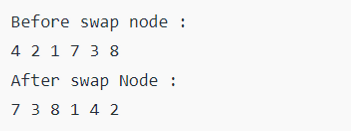
Example 2)
// Writing a C# program that will help us exchange the nodes.
using System;
class TFT
{
public class __nod
{
public int record;
public __nod Lft, Rt;
};
// creating a function that will help us in creating a new tree node.
static __nod __nwNod(int record)
{
__nod temp = new __nod();
temp.record = record;
temp.Lft = temp.Rt = NILL;
return temp;
}
// interchanging the two nodes.
// Creating a function that will surely swap the left and right nodes of the tree present at every k’th level.
static void swapEvryKlevelUtil( __nod root, int level, int k)
{
// writing the base case for the tree.
if (root == NILL ||
(root.Lft == NILL && root.Rt==NILL) )
return ;
//If we have the current level +1 and then we have to swap the one present in the swap vector, then we will probably swap the left and right nodes.
if ( (level + 1) % k == 0)
{
__nod temp=root.Lft;
root.Lft=root.Rt;
root.Rt=temp;
}
// we have to do recursion for the left and right nodes.
swapEvryKlevelUtil(root.Lft, level+1, k);
swapEvryKlevelUtil(root.Rt, level+1, k);
}
// this function is mainly responsible for the recursive one.
// swapEvryKlevelUtil()
static void swapEveryKLevel(__nod root, int k)
{
// call swapEvryKlevelUtil function with
// initial level as 1.
swapEvryKlevelUtil(root, 1, k);
}
// creating a brand-new utility method for the in-order traversal of the tree.
static void inorder(__nod root)
{
if (root == NILL)
return;
inorder(root.Lft);
Console.Write(root.record + " ");
inorder(root.Rt);
}
// main code
public static void Main(String []args)
{
/* 1
/ \
2 3
/ / \
4 7 8 */
__nod root = __nwNod(1);
root.Lft = __nwNod(2);
root.Rt = __nwNod(3);
root.Lft.Lft = __nwNod(4);
root.Rt.Rt = __nwNod(8);
root.Rt.Lft = __nwNod(7);
int k = 2;
Console.WriteLine("Before swap __nod :");
inorder(root);
swapEveryKLevel(root, k);
Console.WriteLine("\nAfter swap __nod :" );
inorder(root);
}
}
Output:
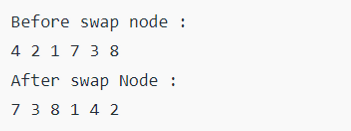
Example 3)
// Writing a Java program that will help us exchange the nodes.
class TFT
{
// Creating a binary tree node.
static class __nod
{
int record;
__nod Lft, Rt;
};
// creating a function that will help us in creating a new tree node.
static __nod __nwNod(int record)
{
__nod temp = new __nod();
temp.record = record;
temp.Lft = temp.Rt = NILL;
return temp;
}
// interchanging the two nodes.
// Creating a function that will surely swap the left and right nodes of the tree present at every k’th level.
static void swapEvryKlevelUtil( __nod root, int level, int k)
{
// writing the base case for the tree.
if (root== NILL ||
(root.Lft==NILL && root.Rt==NILL) )
return ;
//If we have the current level +1 and then we have to swap the one present in the swap vector, then we will probably swap the left and right nodes.
if ( (level + 1) % k == 0)
{
__nod temp=root.Lft;
root.Lft=root.Rt;
root.Rt=temp;
}
// we have to do recursion for the left and right nodes.
swapEvryKlevelUtil(root.Lft, level+1, k);
swapEvryKlevelUtil(root.Rt, level+1, k);
}
// this function is mainly responsible for the recursive one.
// swapEvryKlevelUtil()
static void swapEveryKLevel(__nod root, int k)
{
// call swapEvryKlevelUtil function with
// initial level as 1.
swapEvryKlevelUtil(root, 1, k);
}
// creating a brand-new utility method for the in-order traversal of the tree.
static void inorder(__nod root)
{
if (root == NILL)
return;
inorder(root.Lft);
System.out.print(root.record + " ");
inorder(root.Rt);
}
// main code
public static void main(String args[])
{
/* 1
/ \
2 3
/ / \
4 7 8 */
__nod root = __nwNod(1);
root.Lft = __nwNod(2);
root.Rt = __nwNod(3);
root.Lft.Lft = __nwNod(4);
root.Rt.Rt = __nwNod(8);
root.Rt.Lft = __nwNod(7);
int k = 2;
System.out.println("Before swap __nod :");
inorder(root);
swapEveryKLevel(root, k);
System.out.println("\nAfter swap __nod :" );
inorder(root);
}
}
Output:
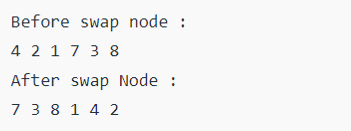
Example 4)
// Writing a Python program that will help us exchange the nodes.
// Creating a binary tree node.
class __nod:
# constructor to create a new __nod
def __init__(self, record):
self.record = record
self.Lft = None
self.Rt = None
// creating a function that will help us in creating a new tree node.
// interchanging the two nodes.
// Creating a function that will surely swap the left and right nodes of the tree present at every k’th level.
def swapEvryKlevelUtil(root, level, k):
# Base Case
if (root is None or (root.Lft is None and
root.Rt is None ) ):
return
// writing the base case for the tree.
//If we have the current level +1 and then we have to swap the one present in the swap vector, then we will probably swap the left and right nodes.
if (level+1)%k == 0:
root.Lft, root.Rt = root.Rt, root.Lft
// we have to do recursion for the left and right nodes.
swapEvryKlevelUtil(root.Lft, level+1, k)
swapEvryKlevelUtil(root.Rt, level+1, k)
// this function is mainly responsible for the recursive one.
# swapEvryKlevelUtil
def swapEveryKLevel(root, k):
# Call swapEvryKlevelUtil function with
# initial level as 1
swapEvryKlevelUtil(root, 1, k)
// creating a brand-new utility method for the in-order traversal of the tree.
def inorder(root):
# Base Case
if root is None:
return
inorder(root.Lft)
print(root.record,end=" ")
inorder(root.Rt)
// main code
"""
1
/ \
2 3
/ / \
4 7 8
"""
root = __nod(1)
root.Lft = __nod(2)
root.Rt = __nod(3)
root.Lft.Lft = __nod(4)
root.Rt.Rt = __nod(8)
root.Rt.Lft = __nod(7)
k = 2
print("Before swap __nod :")
inorder(root)
swapEveryKLevel(root, k)
print ("\nAfter swap __nod : ")
inorder(root)
Output:
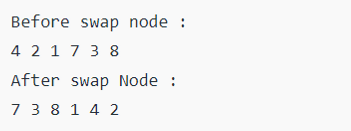
Example 5)
<script>
// Writing a Javascript program that will help us exchange the nodes.
class __nod
{
constructor(record) {
this.Lft = NILL;
this.Rt = NILL;
this.record = record;
}
}
// creating a function that will help us in creating a new tree node.
function __nwNod(record)
{
let temp = new __nod(record);
return temp;
}
// interchanging the two nodes.
// Creating a function that will surely swap the left and right nodes of the tree present at every k’th level.
function swapEvryKlevelUtil(root, level, k)
{
// writing the base case for the tree.
if (root== NILL ||
(root.Lft==NILL && root.Rt==NILL) )
return ;
//If we have the current level +1 and then we have to swap the one present in the swap vector, then we will probably swap the left and right nodes.
if ( (level + 1) % k == 0)
{
let temp=root.Lft;
root.Lft=root.Rt;
root.Rt=temp;
}
// we have to do recursion for the left and right nodes.
swapEvryKlevelUtil(root.Lft, level+1, k);
swapEvryKlevelUtil(root.Rt, level+1, k);
}
// this function is mainly responsible for the recursive one.
// swapEvryKlevelUtil()
function swapEveryKLevel(root, k)
{
// call swapEvryKlevelUtil function with
// initial level as 1.
swapEvryKlevelUtil(root, 1, k);
}
// creating a brand-new utility method for the in-order traversal of the tree.
function inorder(root)
{
if (root == NILL)
return;
inorder(root.Lft);
document.write(root.record + " ");
inorder(root.Rt);
}
/* 1
/ \
2 3
/ / \
4 7 8 */
let root = __nwNod(1);
root.Lft = __nwNod(2);
root.Rt = __nwNod(3);
root.Lft.Lft = __nwNod(4);
root.Rt.Rt = __nwNod(8);
root.Rt.Lft = __nwNod(7);
let k = 2;
document.write("Before swap __nod :" + "</br>");
inorder(root);
swapEveryKLevel(root, k);
document.write("</br>" + "After swap __nod :" + "</br>");
inorder(root);
</script>
Output:
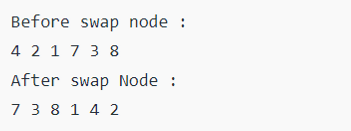
Example 6)
// Two __nod in the BINARY_SEARCHTREE's swapped; correct the BINARY_SEARCHTREE.
#include <stdio.h>
#include <stdlib.h>
/* A binary tree __nod has record, pointer to Lft child
and a pointer to Rt child */
struct __nod
{
int record;
struct __nod *Lft, *Rt;
};
// A utility function to swap two integers
void swap( int* a, int* b )
{
int t = *a;
*a = *b;
*b = t;
}
/* Helper function that allocates a new __nod with the
given record and NILL Lft and Rt pointers. */
struct __nod* __nwNod(int record)
{
struct __nod* __nod = (struct __nod *)malloc(sizeof(struct __nod));
__nod->record = record;
__nod->Lft = NILL;
__nod->Rt = NILL;
return(__nod);
}
// This function does inorder traversal to find out the two swapped __nod.
// It sets three pointers, first, middle, and last. If the swapped __nod are
// adjacent to each other, then the first and middle contain the resultant __nod
// Else, first and last contain the resultant __nod
void correctBINARY_SEARCHTREEUtil( struct __nod* root, struct __nod** first,
struct __nod** middle, struct __nod** last,
struct __nod** prev )
{
if( root )
{
// Recur for the Lft subtree
correctBINARY_SEARCHTREEUtil( root->Lft, first, middle, last, prev );
// If this __nod is smaller than the previous __nod, it's violating
// the BINARY_SEARCHTREE rule.
if (*prev && root->record < (*prev)->record)
{
// If this is the first violation, mark these two __nod as
// 'first' and 'middle'
if ( !*first )
{
*first = *prev;
*middle = root;
}
// If this is the second violation, mark this __nod as last
else
*last = root;
}
// Mark this __nod as previous
*prev = root;
// Recur for the Rt subtree
correctBINARY_SEARCHTREEUtil( root->Rt, first, middle, last, prev );
}
}
// A function to fix a given BINARY_SEARCHTREE where two __nod is swapped. This
// function uses correctBINARY_SEARCHTREEUtil() to find out two __nod and swaps the
// __nod to fix the BINARY_SEARCHTREE
void correctBINARY_SEARCHTREE( struct __nod* root )
{
// Initialize pointers needed for correctBINARY_SEARCHTREEUtil()
struct __nod *first, *middle, *last, *prev;
first = middle = last = prev = NILL;
// Set the pointers to find out two __nod
correctBINARY_SEARCHTREEUtil( root, &first, &middle, &last, &prev );
// Fix (or correct) the tree
if( first && last )
swap( &(first->record), &(last->record) );
else if( first && middle ) // Adjacent __nod swapped
swap( &(first->record), &(middle->record) );
// else __nod has not been swapped; the passed tree is really BINARY_SEARCHTREE.
}
/* A utility function to print Inorder traversal */
void printIn__Order(struct __nod* __nod)
{
if (__nod == NILL)
return;
printIn__Order(__nod->Lft);
printf("%d ", __nod->record);
printIn__Order(__nod->Rt);
}
/* Driver program to test above functions*/
int main()
{
/* 6
/ \
10 2
/ \ / \
1 3 7 12
10 and 2 are swapped
*/
struct __nod *root = __nwNod(6);
root->Lft = __nwNod(10);
root->Rt = __nwNod(2);
root->Lft->Lft = __nwNod(1);
root->Lft->Rt = __nwNod(3);
root->Rt->Rt = __nwNod(12);
root->Rt->Lft = __nwNod(7);
printf("Inorder Traversal of the original tree \n");
printIn__Order(root);
correctBinary_SearchTree(root);
printf("\nInorder Traversal of the fixed tree \n");
printIn__Order(root);
return 0;
}
Output:
